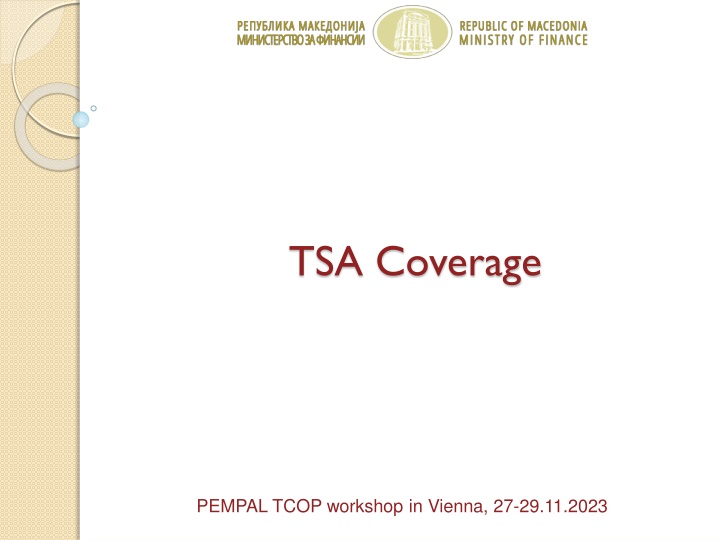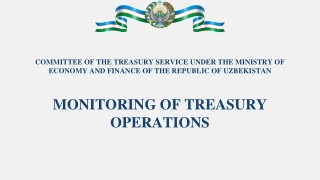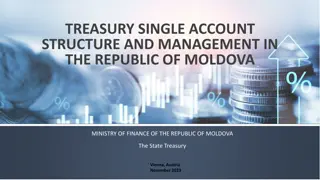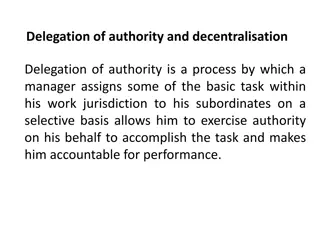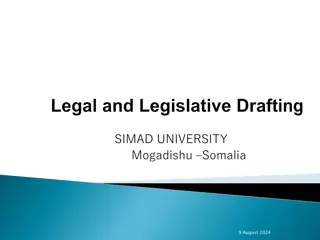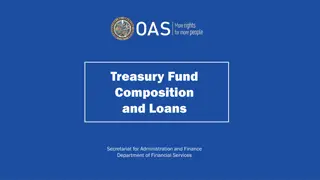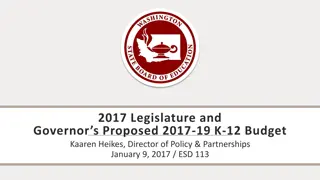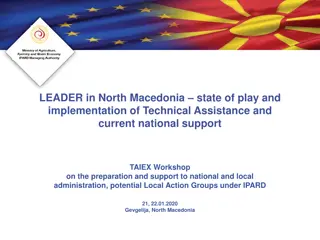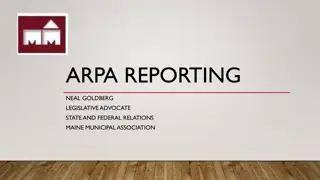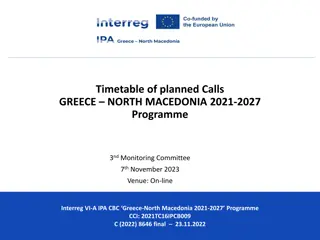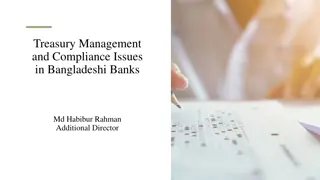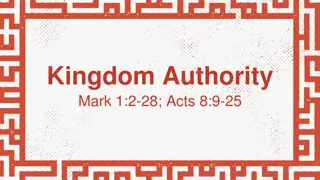Overview of North Macedonia's Treasury Authority and Legislative Framework
This content provides insights into the Treasury Authority's role in managing funds in North Macedonia, including budget execution, internal controls, and reporting. It also discusses the legislative framework governing public financial management in the country, highlighting laws such as the Organic Budget Law and Public Internal Financial Control Law.
Download Presentation

Please find below an Image/Link to download the presentation.
The content on the website is provided AS IS for your information and personal use only. It may not be sold, licensed, or shared on other websites without obtaining consent from the author.If you encounter any issues during the download, it is possible that the publisher has removed the file from their server.
You are allowed to download the files provided on this website for personal or commercial use, subject to the condition that they are used lawfully. All files are the property of their respective owners.
The content on the website is provided AS IS for your information and personal use only. It may not be sold, licensed, or shared on other websites without obtaining consent from the author.
E N D
Presentation Transcript
TSA Coverage PEMPAL TCOP workshop in Vienna, 27-29.11.2023
TSA structure and coverage -Central government (first line users - 93 and second line more than 920) -Extra - budgetary funds (Pension fund and Health fund) -Local government/Municipalities ( 81 municipalities and City of Skopje)
Treasury Authority in managing TSA funds - Establishment and Operation of the Treasury: The legal framework empowers the Treasury Department to establish and operate the treasury, which includes the TSA. This authority involve setting up the necessary infrastructure, systems, and processes for effective fund management. - Receipt and Disbursement of Funds: The Treasury Department is authorized to receive government revenues and disburse funds for government expenditures. The TSA acts as a centralized account for these financial transactions. - Cash Flow Management: The Treasury Department is responsible for managing the government's cash flow efficiently. This includes monitoring cash balances, making payments, and ensuring that funds are available when needed.
Treasury Authority in managing TSA funds - Budget Execution: The Treasury Department plays a key role in budget execution by aligning actual cash flows with the budget. This involves allocating funds according to budgetary priorities and ensuring that expenditures stay within budgetary limits. -Internal Controls: The authority extends to implementing internal controls within the Treasury Department to safeguard against fraud, mismanagement, and errors in financial transactions. -Reporting and Accountability: The Treasury Department is typically required to provide regular reports on the status of government funds, cash balances, and financial transactions. This contributes to transparency and accountability in public financial management.
Legislative framework -Organic Budget Law (OBL): This law outlines the principles and procedures for budgeting, financial management, and accountability in North Macedonia. It provides the overall framework for public financial management. -Guideline on Treasury Operations: This manual typically specifies the establishment and operation of the treasury, including the TSA. It detail the functions, responsibilities, and processes related to the management of government funds within the treasury. -Public Internal Financial Control (PIFC) Law: The PIFC framework is essential for ensuring effective internal control and audit of public finances. This law may include provisions related to financial control mechanisms within the TSA. -International Standards and Recommendations: North Macedonia, as a candidate country for European Union accession, may also align its financial management practices with international standards and recommendations
Pros: - Efficiency and Transparency: Pros: The consolidation enhances efficiency and transparency in financial transactions, as all government funds are managed in a single account. Pros: It provides a clear and comprehensive view of the government's financial position, aiding in better financial management. - Reduced Fraud and Corruption: Pros: Centralizing funds reduces the risk of mismanagement, fraud, and corruption, as it becomes easier to monitor and control financial activities.
Pros: - Cash Flow Management: Pros: Consolidation allows for better cash flow management, enabling the government to allocate resources more effectively and respond promptly to financial needs. - Cost Savings: Pros: Operating costs are potentially reduced since the consolidation simplifies financial processes and reduces the need for multiple accounts and associated administrative overhead. - Improved Fiscal Discipline: Pros: Having a single account encourages fiscal discipline, as it imposes stricter controls on spending and financial management.
Cons: - Operational Challenges: Cons: Implementing a TSA involves significant changes to existing financial systems and processes, leading to potential operational challenges during the transition. - Resistance to Change: Cons: There may be resistance from various government entities, especially at the local level, who may be accustomed to a certain level of autonomy in financial management. -Technological Infrastructure: Cons: In some cases, existing technological infrastructure may not be equipped to handle the consolidation of funds, requiring substantial investments in IT systems and training.
Cons: - Impact on Local Autonomy: Cons: Local governments may feel that the consolidation infringes on their autonomy, limiting their control over financial resources and decision- making.
Challenges: - Legal and Regulatory Framework: Challenges: Ensuring that the legal and regulatory framework supports the consolidation process can be a significant challenge. Legal adjustments were required to accommodate the new financial structure. - Capacity Building: Challenges: Building the capacity of government officials at various levels to adapt to the new system and understand its implications is a critical challenge.
Challenges: - Integration of Financial Systems: Challenges: Integrating diverse financial systems and ensuring interoperability between different government departments and agencies can be technically challenging. - Political Will: Challenges: Implementing a TSA requires strong political will, and challenges may arise if there is resistance or lack of support from key stakeholders.
